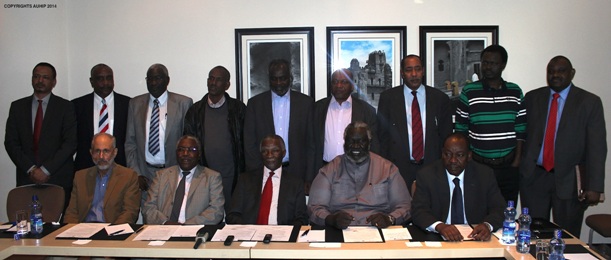Sudan’s NCP says dialogue agreement an “important step” as SRF sees “qualitative shift”
September 5, 2014 (KHARTOUM) – Sudan’s ruling National Congress Party (NCP) has considered the signing of a declaration of principles on the national dialogue in Addis Ababa by the rebels is an important step towards the hold of the conference.

On Thursday 4 September, the external liaison subcommittee of the national dialogue signed a text called “agreement on the national dialogue and constitutional process” with the African Union High Level Implementation Panel (AUHIP) headed by Thabo Mbeki. The same text was endorsed separately and simultaneously by the SRF and NUP leader Sadiq al-Mahdi.
According to SPLM-N secretary-general Yasir Arman, the members of the dialogue liaison subcommittee who inked the deal, Gahzi Salah al-Din al-Attabani and Ahmed Saad Omer, had no mandate to sign such agreement with the rebel alliance. The two delegates are not members of the ruling party which sticks to the Doha Document for Peace in Darfur (DDPD) and the AUHIP brokered process for the conflict in the Two Areas.
The agreement between the national dialogue mechanism (7+7) and the SRF groups “is an important step forward because it meets one of the dialogue requirements which is involving the armed movements in the dialogue process,” said the NCP media secretary Yasir Youssef on Friday.
The NCP “will examine what has been signed with its partners in the national government to consider how to turn it into a work program consistent with the road map, which had previously been signed by the forces participating in dialogue,” Youssef further said.
NCP sources say the ruling party didn’t want to be part of the signing ceremony because it might be understood that the deal was negotiated by the NCP and SRF.
Youssef said that the agreement was signed by the delegates of the dialogue mechanism who are entrusted with contact with rebel groups, adding that the government has its forums for peace negotiations in Addis Ababa and Doha.
QUALITATIVE SHIFT
On the other hand, SRF official for external relations Yasir Arman hailed the agreement inked with the African panel which mediates the peace talks between the government and the SPLM-N on the Blue Nile and South Kordofan states.
Arman said the deal is a boost to their call for a comprehensive and inclusive process, adding it is also an extension to a roadmap for national dialogue the SRF announced last April and the Paris Declaration they signed with the NUP leader, Sadiq al-Mahdi on 8 August.
He said, in line with the agreement, the African Union and United Nations acknowledge for the first time the SRF alliance” after strenuous efforts”. The rebel figure further renewed rebel call for the National Congress Party “to choose the way of change or be changed,” stressing they “will not compromise in their demand for change” in Sudan.
“We will not abandon our demand for a comprehensive solution and will not accept partial solutions. There must be a new national project,” which “provides peace, food, democracy, justice, and citizenship without discrimination,” he emphasised in statements extended to Sudan Tribune on Friday.
Nonetheless, Arman said the SRF would not send a delegation to Khartoum before the signing of a cessation of hostilities agreement.
Khartoum refuses a humanitarian truce the rebels call for and propose a ceasefire agreement to be negotiated as a part of a process for a lasting peace deal.
It is not clear how the national dialogue process will be conducted inside the Sudan before to settle this matter of security arrangements.
The signed deal provides that the dialogue process will commence after an agreement on “rules and procedures on which dialogue will be conducted”, but it does not specify the venue of the talks.
The agreement also underlines the need for guarantees for the conduct and the implementation of dialogue and constitutional process.
AUHIP chief is expected to meet president Omer Bashir on 10 September in Khartoum where he would discuss the content of the signed agreement and ways to implement it.
The 7+7 mechanism is scheduled to meet on Sunday to discuss the agreement and adopt a number of confidence building measures that are supposed to be announced soon by president Bashir, including release of political detainees and public freedoms.
UN CHIEF WELCOMES AGREEMENT
The United Nations secretary-general, Ban Ki-moon welcomed in a statement issued on Friday the signing of an agreement “between representatives of the G7+7 Preparatory Committee for the National Dialogue and the Paris Declaration Group, comprising the National Umma Party and the armed movements”.
He further called on the Sudanese stakeholders of the national dialogue to create a conducive environment before the conduct of the internal political process.
“This includes a cessation of hostilities, guarantees of political freedoms, including the freedom of speech and assembly, the release of political detainees and other confidence-building measures,” the UN chief said.
Ban’s special envoy for Sudan and South Sudan, Haile Menkerios, took part in the meetings of the AUHIP and Darfur joint envoy with the SRF groups last week before the signing of the agreement on the national dialogue.
The SRF and NUP demand that the UN special envoy be implicated in the negotiations of a framework agreement for the national dialogue and security arrangements. They demand that these talks be held outside the country.
Presidential assistant Ibrahim Ghandour insisted in statements on Friday on the national and internal character of the process.
Speaking to the NCP membership in Damazin, capital of Blue Nile state, Ghandour stressed that “Khartoum is the venue of the dialogue to discuss issues of Sudan”, rejecting all foreign intervention “because the Sudanese knowledgeable to their cases,” he said.
(ST)
